Rough and tumble beauty
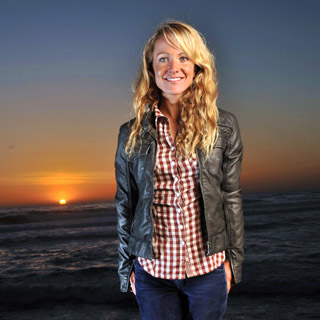
Lesley Paterson overcame two flats and a fall on the run to win the XTERRA World Championship in Maui last October. And just last weekend she crashed to the ground at the tape in a finish line sprint for the win she lost by 3/10 of a second to Renata Bucher at the XTERRA West Championship in Las Vegas. But none of these sporting adventures should surprise. From the time she was seven years old back home in Scotland, she loved crashing full tilt into the boys in rugby and running through the freezing, muddy moors in cross country. Twenty some years later, she lives in San Diego and races well in tropical heat in XTERRA, all the while pursuing a parallel passion for theater and film as an actor, writer and producer. She tells her story with a great Scottish accent laced with some casual swearing you don’t usually hear from a swimsuit model.
Slowtwitch: What does it mean to be a young girl playing sports in Scotland?
Lesley Paterson: It means you have to be pretty hardy. Growing up in Scotland, you don’t get much sports with girls. It’s pretty much all boys.
You have to be pretty ballsy. And you have to want to stand out from the crowd. Because if you do any kind of sporting activity you are going to.
ST: What was your first sport?
Lesley: I began playing for the boys’ team of the Stirling County Rugby Club when I was 7. I was the only girl among 250 boys. The boys either wanted to tackle me extra hard or were too scared to come near. I loved to get dirty and I loved to fight the boys. I learned pretty quickly how to take care of myself with some talented kids. I played with a lot of guys who went on to play internationally for Scotland.
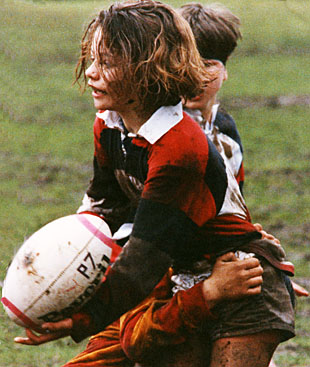
ST: How did you hold your own?
Lesley: When you are 7 or 8, boys and girls are about the same size. It’s full contact when you are that age and technique and speed make the difference. It was cold, it was muddy, it was rough. I didn’t have anywhere to change. I would finish a match covered head to toe in mud. I went to the bathroom, wash off in a basin, put my clothes on and go home for a shower.
ST: How did they treat you?
Lesley: If you were good enough to be on the team, they would support you. Sometimes they’d be a bit standoffish. But once they got to know me, I was one of the boys..
ST: What about opponents?
Lesley: Often you would walk out on the pitch and people would go 'Ahhh it’s a girl!!' Then the game starts, you knock the shit out of them, and they shut up.
ST: Other pursuits?
Lesley: I was a dancer at the same time. On a Saturday mornings I would play rugby from 9 'til 10:30 then I would go to ballet from 11 ‘til one. I would have muddy knees and my ballet whatevers, my tutu, on. It was pretty funny.
ST: Which was tougher?
Lesley: I am a bit of a rough and tumble kind of person. So that is why I love off road triathlon. I love to get muddy. So my heart was more with rugby. The ballet was harder for me because my heart wasn’t in it to the same extent.
ST: What other sports came next?
Lesley: When I left rugby I took up cross country running.
ST: What did you like about it?
Lesley: I did a lot of hill running which Scots call fell running, ov er the moors. It’s kinda primal. That's why I loved it.
ST: How good were you?
Lesley: I won the Scottish girls high school cross country championship.
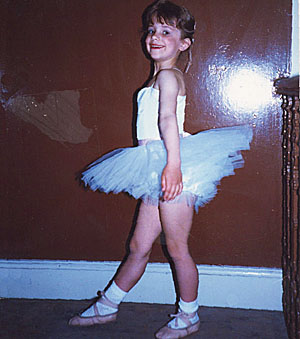
ST: When did you take up triathlon?
Lesley: I was 13 and I was looking for something to sink my teeth into and channel my energy. My dad was into triathlon so I joined the Stirling County Triathlon Club.
ST: How good were you?
Lesley: I won the junior Scottish championships in my third triathlon when I was 13 or 14. As a result I got invited to the British national team camp and raced under the colors of Great Britain. In my first international race, the 1996 European youth championships, I was in 65th out of the water, cycled to 17th and ran to 7th. I hadn’t swum before.
ST: By 1996, triathlon had been accepted to the Olympic Games. How did that affect you?
Lesley: At that time there was a change in triathlon from non drafting to draft legal racing, which made swimming much more important. At the time, a lot of good swimmers came to the sport. That proved to be incredibly challenging for me mentally and physically. I spent the next 2 or 3 years swimming twice a day, week in and week out, and went all over the country to get the best swim coaches. As a result, my strengths – the bike and the run – took a hit.
ST: You were at University during this time. What was it like?
Lesley: I was at Loughborough University in England. I studied drama and my training partners in triathlon and running squads all studied sports science. So majoring in drama was a blessing and a curse. As much as I loved the arts, most drama students did not get up ‘til 11 and worked ‘til 2 AM. Sports science students got up at 5 AM and were asleep by 9. Drama students thought I was a freak because I didn’t smoke or drink. And sports science students think you are off your rocker working on stage at all hours.
ST: How much of your identity was wrapped up in sport?
Lesley: One day when I was 17 I was knocked off my bike and I suffered a freak foot injury to my metatarsal. I was not able to run for a year and a half and I was a bit shattered for sure. At that time I did not have the maturity to understand the process of recovery and that made it harder because I was so passionate about sport. I shed a lot of tears. I guess that was why I remained so close to my parents. I spoke to my mum and dad a few times a day.
ST: How important were they?
Lesley: My dad Alistair is pretty ballsy. If there is something he wants to do he doesn’t worry about it. He just goes and does it. My mom Fiona is equally fearless. When I was 10 years old, my parents bought a hotel which my mom managed and ran. They’ve done a lot in their lives and have always been very, very supportive of all four of us kids. When you have that support, it makes it possible to go after big things.
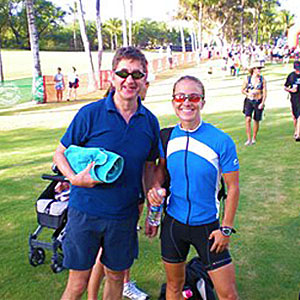
ST: Despite that support, how dark were your dark days?
Lesley: When you believe you’re special or have something special to offer, and you experience roadblocks all the time, a lot of self doubt creeps in. You wonder if your dreams are possible.
ST: You must have had a few like-minded friends?
Lesley: I didn’t have many friends in primary school. It was the same in high school — I didn’t hang out in the mall, I was out training. When I was on the National squad and raced abroad, I got no support from school, no support from friends. To them I wasn’t normal. I stood out — and if you stood out, no one liked you. I was a straight-A student but still got reprimanded for being a bit late because I’d been training early in the morning. It was ridiculous. I didn’t have a good time in school and a lot of resentment built up in me.
ST: Was it different when you were with the British National team?
Lesley: It was no better. It was very elitist. If you weren’t a good swimmer, they didn’t give a shit about you. You were pushed aside. I was only 15 and it was pretty brutal. If you did not cut the mustard, you’re out.
ST: Any moments stand out?
Lesley: I was 16 or 17 and traveled to an ITU race in Stellenbosch, South Africa. They took the juniors to the course and the coaches completely ignored me. I wondered Where do I go? Where is transition? Where is the swim exit? I had to find everything for myself. All the while, the coaches literally held the hand and walked the course with this great swimmer who was their favorite. When I beat her, not one of the coaches said a word to me. When you’re 19, you might have the confidence to see that was their problem. But when you are 16 or 17, it matters. Interestingly, Simon Lessing was the only person to come up to me and say ‘Well done.’ Add it all together and I thought ‘Then fuck everybody!’
ST: How long did this go on?
Lesley: When I was 20 or 21 I was really struggling with confidence and I missed qualification for the Commonwealth Games by about 5 seconds. I realized I did not enjoy this. I thought ‘I am not good enough and I do not want to keep hammering myself into the ground.’ I gave up.
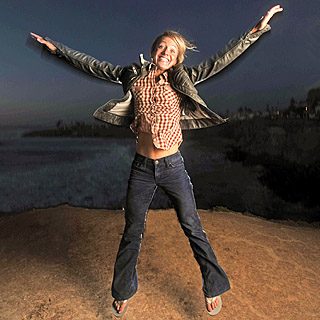
ST: What then?
Lesley: I got my degree at Loughborough, met my soon-to-be-husband and got engaged. Then my fiancé Simon Marshall was a job in San Diego as a sports scientist. We married in Scotland and moved a week later. I was happy. I’d met the right guy. He was my rock and we will be celebrating our 10th wedding anniversary this summer.
ST: How did things go in the U.S.?
Lesley: Moving to San Diego was a godsend. Back in Scotland I was known solely as a triathlete. I was in my mind a total failure. I had been in total depression and wondering ‘What do I do with my life now?’ So moving to California and reinventing myself was perfect. I enrolled in a Masters program in Theater at San Diego State and I soon I was acting in plays and student films, taking film classes and absolutely loving it. I remember thinking, ‘Oh my god, this is the passion I lost in triathlon!’
ST: After you graduated, what did you do?
Lesley: I started to go back and forth to LA to audition for films and commercials and ended up getting an agent. I acted in a bunch of independent films and played the lead in a music video by Alibi that won some awards. It was poetic and I played this girl whose life went from disaster to a rebirth — a path that sort of mirrored my life.
ST: How did it feel gaining recognition in the arts?
Lesley: It felt great! More than anything, I knew how hard the acting and film business is. In a sense I moved from one shark tank to another. I had resilience and dedication from triathlon and applied that to the film world. I may not have the most talent, but I work harder than almost anyone I know.
ST: How did your immersion in the arts change your outlook?
Lesley: The thing about acting is you get ‘No’ all the time. That made me a bit harder. My emotional investment in my work became more about the craft and love of it rather than winning and losing roles. Triathlon had been all about results, times, numbers – a very external way of looking at the world. I didn’t look at things like that any more. When you’re acting and being creative, you start to evoke emotions. I would almost enjoy being depressed because you can access stuff from that and overcome a lot of fears. In triathlon I worried about what people thought of me so I just aimed to do well enough so I didn’t embarrass myself.
ST: Did acting free up your perspective on triathlon?
Lesley: Most people don’t understand the anxieties that can go on with an athlete. Many athletes expect to have the same motivation and strong approach to the sport every time out. I am quite different. I am not like Julie Dibens and Mirinda Carfrae, who have even temperaments and can have great performances back to back to back. I have many more emotional and physical ups and downs.
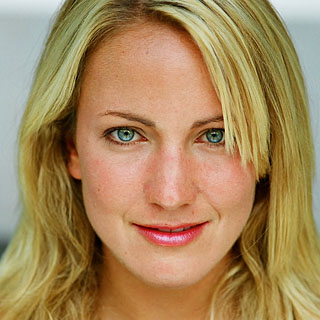
ST: Beyond performing, you also got involved in writing and producing?
Lesley: In my journey into the world of film, I met a triathlete, Ian Stokell, who wanted me to start writing with him. He convinced me if I really wanted to act in worthwhile projects, you must make your own film and put yourself in it. In addition to writing scripts together, we also produced independent films like Something Blue, which was made in 7 days with two directors, a dozen or so actors, in 27 locations, on a $10,000 budget.
ST: Did that mean a lot of staying indoors, sweating our scripts?
Lesley: We wrote and then did a bunch of crazy ass stuff all over the world to get projects going. We bought the rights to the novel “All Quiet on the Western Front” and wrote a new screenplay for it. In 2009, we met with Daniel Radcliffe who played Harry Potter and he attached himself as an actor with our film. He is now off the project. So we push ahead, knowing many films can take up to 10 years to see the screen.
ST: What are your dreams for your film?
Lesley: I want to win an Oscar for best screenplay and best picture as producer. That’s a lofty goal — but fuck it!. I have to have it.
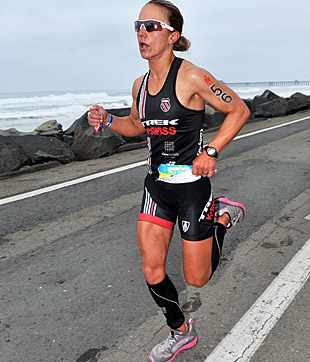
ST: When and why did you go back to triathlon?
Lesley: In 2005 I started running a few 5ks in the local Desert Dog series in San Diego and got my ass kicked, but I really enjoyed it. After that, I did a few triathlons. In my first XTERRA in 2008 in Temecula, I was out of the water with Michellie Jones and led during the bike. But I had to walk a lot of the run because I neither drank nor ate and bonked. I got 2nd in my next XTERRA race, in Alabama.
ST: Was there a performance that led you to commit to triathlon again?
Lesley: I was 2nd at the 2009 XTERRA World Championship and that was massive — real huge. My dad Alistair flew in from Scotland and he and my husband were there screaming and jumping up and down in the last mile. Then my dad ran the last 100 yards with me.
ST: Early the next year, you made your mark in pavement triathlon, taking 2nd at Ironman 70.3 California.
Lesley: I just started to work with coach Vince Fichera, who revolutionized my training and helped me understand how to get the most out of myself. I had great training up to Oceanside and came to that race with no great expectations.
ST: What made the difference?
Lesley: A lot of long slow distance, and focusing on doing the right stuff for me. I used to spend a lot of time training to other peoples’ workouts. With Vince I gained confidence that when I trained right, good results would follow. And so I left behind all the negative self talk.
ST: Even as you started to get great results, you had more setbacks.
Lesley: Just before Oceanside in 2010, I fell off my mountain bike and damaged my knee. I ran in a world of pain and got second, but after the race I could not run for 10 weeks. I went from incredible elation to frustration.
ST: When did you return to form?
Lesley: When I came back in the summer of 2010, I thought I had to ramp it up and trained so hard my immune system was really compromised. I got a parasitic infection and I was losing weight, nauseous, and fatigued. I took antibiotics and thought I got rid of it and had good winter training. But then I came down with a groin injury and could not run for another 10 weeks and missed Oceanside.
ST: You are always fighting uphill battles.
Lesley: It was another blow, but I managed to regenerate and had a really great first half in 2011 and won a 70.3 race. Then I started to get symptoms and had to back off again. Turns out I had Lyme disease. Then I went to see Dr. Alexander Shikhman at The Institute for Specialized Medicine in Del Mar.
ST: What did he do for you?
Lesley: He did a lot of testing on me and found out lot of things besides Lyme disease were going on in my system. I have bad gluten intolerance and I went on gluten free diet a few months before XTERRA Worlds. He also put me on supplements to deal with fatigue and get my nutrient levels back up.
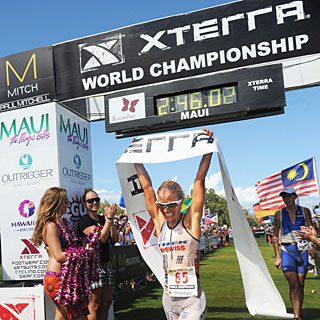
ST: How good did you feel at Maui last October?
Lesley: Going in, I felt very, very up and down, which is one of the traits of Lyme disease. When you go to a race in a hot climate, your symptoms get worse the first few days. So I went to Hawaii early and did some hard training sessions and felt ghastly. As the race drew near, gradually it got better and on race day I felt great.
ST: How did you come from so far back?
Lesley: I think the XTERRA World Championship race was a microcosm of my life. There was a lot of adversity to overcome. The minute I hopped on my bike my tire went flat. I never, ever had a flat tire in a race before. I managed to fix it but within a mile and a half it went flat again. I lost at least 90 seconds and I just thought, ‘Well, fuck it! I might as well enjoy myself.’
ST: Did you think it was over when you came off the bike 6:30 down to McQuaid?
Lesley: I just remember running up the first hill thinking ‘Wow! I feel amazing.’ I caught all the girls but Melanie in two and a half miles.
ST: Do you think you won it or Melanie lost it when she collapsed?
Lesley: I think I had something to do with that. I pushed Melanie a lot. She said she went hard as she could up the hills on the first half of the run and thought she could keep the pace going down the hills near the end. I think she got it wrong. Plus I was running very well – my 43:54 split was the same as Michi Weiss’s [who won the men’s title] even though I tripped on a rock and crashed arse over teakettle in the last half mile.
ST: How did victory feel?
Lesley: It’s a bit unreal to come to the lead so late. I just wanted to get across the finish line OK. Then I felt shock and disbelief and joy and all of those feelings.
ST: Did winning the World Championship make a difference to your self confidence?
Lesley: The difference is massive. More than anything, you get to keep the World Championship title for the rest of your life. You know it’s something that 99.99 percent of people never get. It has made a difference and opened doors — especially now that I am developing a reality television series about working with kids and sport.
ST: How do you feel about being a model in the Triathlete swimsuit issue?
Lesley: I love doing stuff like that. I love to perform whether for camera or video or on stage. If I have an asset worth exploiting, I am not prudish about it. If I have it, I might as well use it.


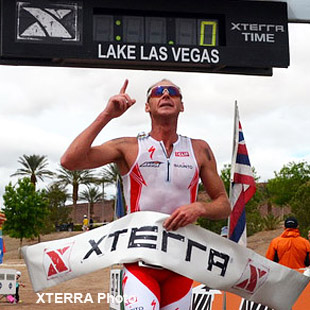
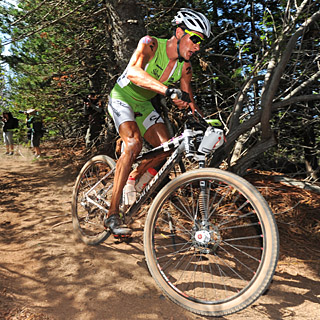
Start the discussion at slowtwitch.northend.network